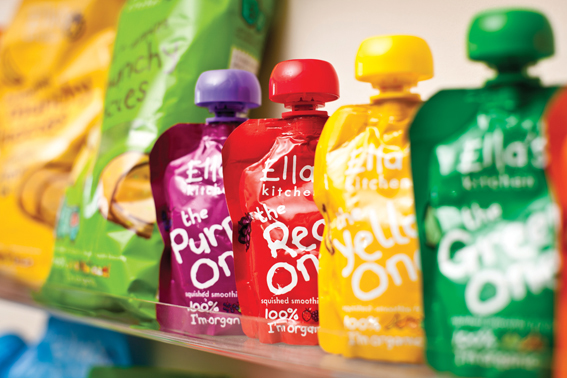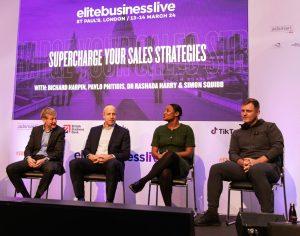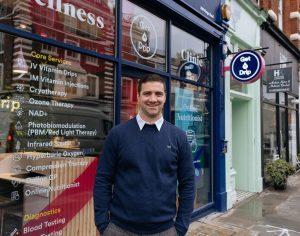Boosting exports is very much at the top of the agenda. Speaking at MADE: the entrepreneur festival last month, business secretary Vince Cable said a renewed focus on exports may be just the thing to drag the UK from the doldrums and subsequently announced £13m in funding had been awarded to help SMEs with exactly this task. What’s more, a reinvigorated appetite for all things British, thanks to London 2012, means there has never been a better time for a UK business to flog its wares to the world. This is a sentiment shared by Paul Lindley, the man behind international success story Ella’s Kitchen.
Lindley has never been one for standing still. As a child, he had an appetite for adventure. His childhood was split between the UK and Zambia, after his civil servant father was seconded to the African country. “During school holidays in Zambia, it was all about being outdoors and exploring,” he recalls.
At the age of 11 he moved back to the UK to attend a boarding school in Derbyshire, returning to visit his parents in Zambia during school holidays. He was bright and, unlike most people who find find it easier to engage either the creative or logical part of their brain, Lindley was good at both art and the sciences. He plumped for the sciences when choosing his A-levels and then, once again, when he applied for university, enrolling on a cellular pathology degree at Bristol University.
“Only about three universities did cellular pathology then,” says Lindley. “I was good at biology and I like doing things that are different.” But it was soon clear that this bet hadn’t paid off. “A week in, I was asking myself, ‘What have I done?’” He quit the course after one term and instead read politics and economics, subjects that appealed to the creative in him. But the extra year it took for him to graduate cost him dearly in the rat race to secure a job. “I left university in 1989 in the midst of the recession,” he says. “My friends had all applied for jobs in 1988 and had had no problem, but when I came to apply for jobs in 1989 there were none left.”
Without a job to go to, Lindley decided the best course of action would be to further his education, so he embarked upon the training to become a chartered accountant – eventually leading to a job at KPMG. “I didn’t really enjoy it at the time, to be honest,” he admits. “But 15 years later, when I set up my business, it proved absolutely invaluable.”
After four years at KPMG in London, Lindley married his university sweetheart, Alison, and they went on a six-month honeymoon, before relocating to LA for a year. On his return to the UK, Lindley was on the look-out for a new challenge, and became financial controller at kids’ TV station Nickelodeon in 1995.
“It was great,” Lindley says. “I had a bright coloured office, filled with big toys. This is when kids’ multi-channel TV was brand new so it was a very exciting time.”
What’s more, Nickelodeon had a buzz unlike anything Lindley had ever experienced before – due in part to its young management team. “It felt entrepreneurial,” he recalls. “It was creative and I loved it.”
His progressed quickly through the ranks, joining in a purely financial role and leaving nine years later as general manager in the UK. This also meant that his knowledge of running a business deepened – it was no longer just about the numbers, but sales and marketing too. “I really understood kids – how they develop, how a boy and a girl are different, how an eight-year-old and a three-year-old are different, and how they respond to parents, siblings, friends and brands.”
Around the same time, the children’s TV channels were coming under fire for not doing more to help problems around infant obesity. And the challenges associated with raising healthy, happy children were prevalent in his home life too: Lindley became father to a daughter, Ella, in 1999 and a son Paddy in 2001. “I was a really active father,” he says. “I was really interested in how they were developing and wanted to form close bonds early on.”
One of the ways in which this manifested itself was becoming really involved in his children’s diets, ensuring they were trying always new foods. “We would use games to make Ella try new things,” he recalls.
In 2003, ahead of a camping holiday, the Lindleys were browsing supermarket shelves looking for kids’ food that was healthy but convenient – and found the cupboards were bare. This obvious gap in the market, combined with Lindley’s experience of marketing to kids, as well as an astute awareness of increasing childhood obesity, cemented the idea of Ella’s Kitchen in his mind. “I knew I could create a brand of food for kids that brought together health, convenience and fun,” he says.
After doing some non-scientific research among other parents, six months later Lindley left Nickelodeon to focus his attention on Ella’s Kitchen. “I knew I’d regret it if I didn’t do it,” he recalls. He gave himself two years to make a success of the business. “I was at the stage in life where if we didn’t go on holiday or go out to eat, we could afford to survive for a couple of years without a regular income.”
Meanwhile, Lindley had discovered squeezable pouch packaging in France that would be great for both the brand and practical use. “People said, ‘You can’t do that. You need to put it inside a glass jar so everyone can see the contents.’ But I ignored them. I thought that there was something very convenient about being able to put the cap back on and store it in a bag for later,” he says. “It’s also a better experience for the child. They could hold it and own it, and feed themselves with it as they got a little bit older.”
And with that, the entrepreneur went off to pitch the concept for his children’s food to UK supermarkets with a trick up his sleeve: he had a written agreement that would pique the interest of the supermarket buyers. “I went to all the kids’ TV channels and said ‘I know you don’t always sell all of your advertising all year round, because I used to sit where you’re sitting now. And I also know you’re being blamed for obesity in children because they’re sitting there watching bad ads. So how about you give me some of the airtime you’re not going to sell and I’ll give you some revenue?’ And my old employer Nickelodeon said yes.”
The potent marketing plan meant for the first six months after launch, two-thirds of the under-four-year-olds in the country would see an advert for Ella’s Kitchen. This was enough to persuade supermarket stalwart Sainsbury’s to take a punt on the fledgling idea.
The pressure for Lindley was now really on: “With the retailers, if it doesn’t work after a 12- to 24-week-period, they throw you out,” he explains. He’d put £20,000 aside for the project, but now faced with having to supply one of the biggest supermarkets in the country, it was clear this wouldn’t be enough cash to get the project off the ground. His wife agreed to remortgaging their house for £200,000 and Ella’s Kitchen launched in Sainsbury’s on January 22, 2006 with two products.
The UK’s appetite for good-quality children’s food was even more fierce than Lindley had anticipated. For the first five years, the company’s revenues more than doubled each year and last year £65m of family household budgets was spent on Ella’s Kitchen products. Removing retail margins and so on, this equates to £41m in turnover for the Henley-upon-Thames-based company.
But while heady growth is great for the bottom line, it can be difficult to manage. It is not unheard of for young businesses to be victims of their own success and end up hitting the runners because they run out of cash. But Lindley’s background in accountancy stood him in good stead when it came to managing cashflow. “When companies fail during fast growth, they usually fail because they run out of cash. They grow so fast that they forget they need more stock and marketing to support that. With my background as a chartered accountant I worked that out very early.”
Lindley was a man on a mission: for him, it was personal. As a father and as someone involved in industries selling to children, he felt an overwhelming desire for Ella’s Kitchen to have an effect on the children’s eating habits and attitudes towards food. The business is focused on ethics and making a difference – and not just on the bottom line. “No entrepreneur should start a business just because they’re trying to make money – because you won’t if you’re not really passionate about it.”
Another pillar of the business that has been fundamental to its success has been its roaring trade overseas. Ella’s Kitchen is currently sold in 12 territories worldwide including the USA, Norway, Sweden, Estonia, Australia and South Africa, with 44% of total revenues (£18m) last year coming from overseas sales.
Lindley hopes his story of exporting triumph will spur on other entrepreneurs and growing businesses to look at international expansion too. “There’s never been a better time to go international,” he urges. “And that’s regardless of size: it applies equally whether you’re a start-up, an SME or a large company.”
This is largely down to two factors, says the entrepreneur. “We live in a time and place where free trade is the dominant form of economics,” he argues. “It wasn’t always like that. And it means that as part of the European Union we can trade with 26 other countries as if it were the UK – there are no tariffs.” We have further advantages thanks to our status as English speakers.
Lindley also points to the BRIC economies (Brazil, Russia, India and China) as potential markets, due to their staggering capacity for growth. “There are a whole load of markets that are growing really, really fast, whereas, generally, we’re stagnating as an economy – although there are pockets that are growing within it.”
What’s more, right now the spotlight is on Britain and British organisations. After London was put under the microscope with the Olympic Games this summer, never has there been a better time to be British, says Lindley. “The rest of the world saw us as winners. And they saw us humble and with humanity at the Paralympics. They saw creativity with the opening and closing ceremonies, and they saw humour with the Queen jumping out of that helicopter. All that stuff has built up a brand Britain.”
“‘Team GB’ was no accident, says Lindley. It’s now a global brand – and one that entrepreneurs must take full advantage of. “It’s an own goal if we don’t go out and try to ride on the back of that.” he concludes. “The world is watching.”
Share via:


















































